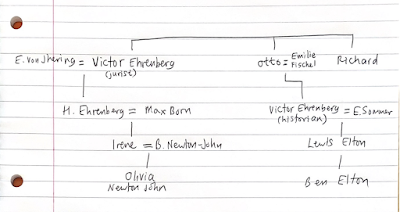Thanks to the algorithmic wonders of Google Scholar, I get sent an email every few days with updates on wheter people are finding my past research interesting, through citing my papers. Today I got an email with details of three new citations, including something I'd not noticed in these emails before - an extra addition of highlighted text saying "100th citation". This means that according to Google Scholar my student Phil's paper with me and his other co-supervisor Arnau, "Fission dynamics within time-dependent Hartree-Fock: Defomration-induced fission", has been cited 100 times.
All about nuclear physics - research, news and comment. The author is Prof Paul Stevenson - a researcher in nuclear physics in the UK. Sometimes the posts are a little tangential to nuclear physics.
Friday 12 August 2022
Happy 100th Citation
A new old book
I received in the post yesterday a book that I ordered second hand online. It is the Proceedings of the International School of Physics «Enrico Fermi» Course XXXVI, edited by C. Bloch. Here's the (rather dark) cover:
The book was sold as an ex-library book and indeed inside I see it stamped with "University of Salford", and there is even still the place where the librarian used to stamp the return date. The single date stamped is 11. OCT 1968:
I bought the book because (a) I saw it online for £1 + postage and (b) different lectures in it are referenced in a couple of places in papers I come back to quite often: One is paper 4 in the series introducing the Lipkin Meshkov Glick Model: D. Agassi, H. J. Lipkin and N. Meshkov. Nucl. Phys. 86, 321 (1966). There, they reference "K. Bleuler, seminar delivered at Varenna Summer School (1965) unpublished", but the seminar was published presumably after Agassi et al. submitted their paper, in 1966 in these proceedings.
The other paper I know of referencing the book is one in the generator coordinate method is used to describe giant resonances: H. Flocard and D. Vautherin, Nucl. Phys. A264, 197 (1976). It's a method that I think bears revisiting with modern time-dependent Hartree-Fock codes as the generator of the basis states, so I go back to this paper whenever I am working on this new application. There is an expression in the paper which is supposed to be found by "A straightforward calculation [see for example the appendix of ref. 6)]". I have managed to work out the expression, though I'm not sure I would call my method straightforward, so I was interested to see the sppendix of ref 6, which of course is an article (by David Brink) in "Proceedings of the International School of Physics Enrico Fermi Course 36 ed. C. Bloch (Academic Press, New York, 1966)."
Now at last I have the book, and I can read the articles referred to, or more likely, look at the book on my shelf and realise I can, at some point, read those articles.
The book contains a picture with an overlay legend showing attendees at the conference. Here are photos of the picture, and the overlay. If you click on them you should see them in as good a resolution as I was able to take with my phone camera. If anyone is really interested in seeing the best resolution I can get, please leave a comment and I'll see what I can do.
Wednesday 10 August 2022
Olivia Newton-John, Max Born and Lewis Elton.
A couple of days ago the death of singer/actor/activist Olivia Newton-John was announced. I was aware, thanks I think to my colleague Jim Al-Khalili telling me many years ago, that she was the granddaughter of Max Born.
Max Born was a big name in quantum mechanics, famous amongst other things for the interpretation of the modulus-squared of the wave function as a probability density (the "Born rule"). Born was German and Jewish, and in 1933 almost as soon as the Nazis came to power he was suspended from the University of Göttingen. He managed to obtain a temporary position in Cambridge, England, and so emigrated to the UK where he remained until retirement, having secured a professorship at Edinburgh.
Born's daughter Irene married a Welshman called Bryn Newton-John, and they had children including the famous Olivia.
What I didn't know before reading about Olivia following her death is that she is also related to my predecessor in the nuclear theory group here at Surrey, Lewis Elton. The link is flagged up on Wikipedia because Lewis was the father of Ben Elton and the connection to Ben is mentioned, rather than to Ben's (less famous) father.
A little digging on Wikipedia allows the full family link between Olivia Newton-John and Ben Elton to be worked out, and hence the family link between Max Born and Lewis Elton:
Max's father-in-law, Victor Ehrenberg (jurist), had a brother Otto Ehrenberg. Otto's sons include another Victor Ehrenberg (historian), and this Victor was the father of Lewis. Here's the relevant section of the family tree:
My sort-of relation to Max Born can be seen in the Mathematics Genealogy Project. It shows a kind of family tree of supervisor-student relationships for PhDs in Mathematics and related areas, including theoretical physics. Max Born was my great-great-grandsupervisor, through his student Viktor Weisskopf, then Arthur Kerman, Mike Strayer, who was one of my PhD supervisors. "Family" tree below:
Thursday 4 August 2022
An interview with me
I am the holder of an AWE William Penney Fellowship, and today, a Q&A style interview with me appeared as a profile on their website: here. If you go to the main case studies page you can read lots of other profiles. One thing is for sure - you can tell that my photo was a selfie taken on my 8 year old phone, and the other people had their pictures done by a proper photographer.
Monday 1 August 2022
Reader, I ...
Today is the day my University has slightly moved away from the traditional UK University job titles (as many other Universities in the UK have done). The academic ranks used to run Lecturer → Senior Lecturer → Reader → Professor. Now they have made the rather minor change to Lecturer → Senior Lecturer → Associate Professor → Professor.
This seems a slightly odd thing to do, as in the US, which rather dominates the world in higher education, the job title of Associate Professor is more like our Senior Lecturer, while our Reader roughly corresponds to the lower half of the US professor grade.
Well, the changes make little material difference to anything. Being a Reader (my grade) is a bit of a strange job title, as people not familiar with universities must wonder how someone's job can be to read stuff, and "associate professor" at least includes the recognised word "professor". Still... those already on the disappearing Reader grade were given the option to keep it for now (until promoted to professor). In the end, I decided I would keep the reader title that I've had for a while. I have around 20 years left to fail to get promoted, and I might just end up the University's only Reader in the mid 2040s since anyone newly promoted to the grade will have to take the new associate professor title.
RIP Nichelle Nichols 1932-2022
Yesterday the death of Nichelle Nichols was announced. Her link to this blog is a bit tangential. She was an actor, singer and model whose iconic acting role ended up being as Lt Uhuru in the original Star Trek series. I was a fan of Star Trek (and still am) from a young age, watching it with my mum, and over the years I've probably watched the episodes of "TOS" (the original series) many times. In fact, I am in the middle or revisiting them all with my 8 year old daughter, and we watched the episode The Return of the Archons together last week.
I don't know if my interest in Star Trek was related to my interest in things sciency in general, or whether it even promoted my interest in science things, but I certainly am not alone in the world of physics being a Star Trek fan, starting from watching TOS with my mum, and then the Next Generation, Deep Space 9 and Voyager.
When watching Star Trek as a child, I had no understanding of the racial politics in the US and how groundbreaking it was to have a black woman in such a major role in a primetime TV show. There's a nice story on her wikipedia entry about how she wanted to leave Star Trek after the first season to take up a role in a play on Broadway, and Martin Luther King Jr asked her to stay in Star Trek, as he recognised the important role model she had become to black people, and so she stayed throughout the whole run of series, and all the spin-off films, too.
RIP Nichelle Nichols 1932-2022








